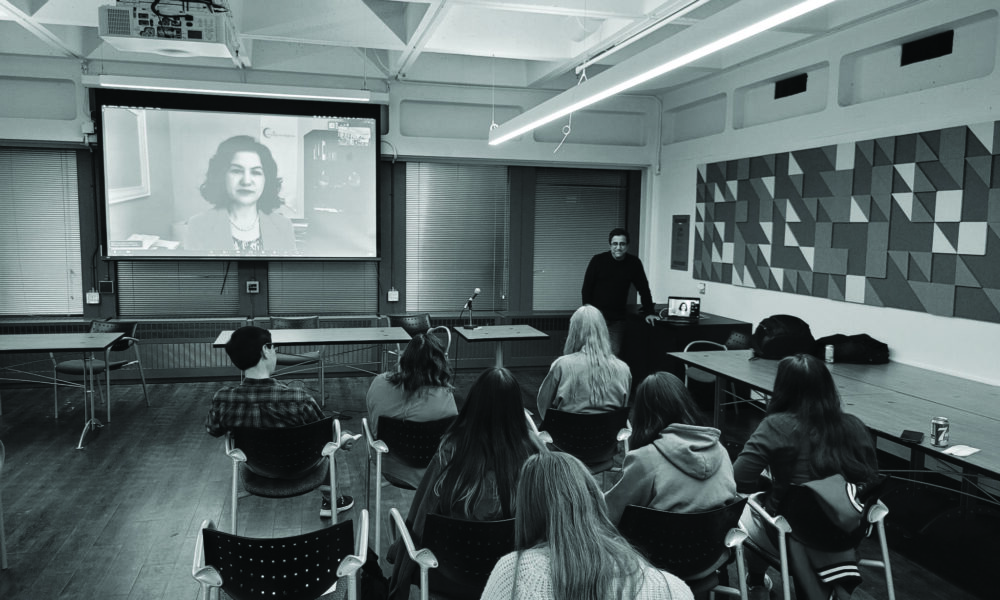The Students’ Society of McGill University (SSMU) hosted an advocacy event in support of Uyghur rights on Oct. 18. Uyghurs are a Muslim minority group mostly residing in the Xinjiang Uyghur Autonomous Region of China. For years, Uyghurs and other Turkic Muslims have been the victims of human rights violations and forced labour by the Chinese government.
There are currently an estimated 380 forced labour camps in the Xinjiang region.
The event, led by the Uyghur Rights Advocacy Project (URAP), featured a panel discussion about McGill’s endowment fund―specifically, investments into companies complicit in the Uyghur genocide―as well as Motion M-62 which aims to expedite the entry of 10,000 Uyghurs and other Turkic Muslims into Canada over a two-year period beginning in 2024.
Miri Teich, Policy and Advocacy Director at URAP, said that a //Tribune// investigation during the Winter 2022 semester—which revealed that McGill has millions of dollars invested in companies complicit in the genocide—inspired URAP’s most recent project. URAP began its advocacy work in May 2020 and since then, have conducted extensive research and data analysis into the university’s portfolio holdings.
Eli Offman, a volunteer data analyst at URAP, explained in an interview with the //Tribune// that the algorithm he created helps URAP determine which of McGill’s stock holdings are placed in companies implicated in forced labour.
“I take publicly available data and I compare it with the McGill portfolio,” Offman said. “I essentially created a relatively basic search function that [determines if] any of the companies listed in these stock holdings match with any of the companies implicated [in forced Uyghur labour].”
Teich added that the organization has found many connections between McGill’s stock portfolio and companies using forced labour.
“We found 437 entities [that] matched directly, amounting to $67,630,181 in market value (around four per cent of McGill’s holdings),” Teich wrote in a statement to the Tribune. “This is a low estimate; if you include Chinese companies, the number goes up to 660 companies amounting to $139,770,302 in market value (nine per cent of their holdings).”
According to Teich, most of the worst offenders are China-based companies that supply both raw materials and software to bigger-name brands, many of which are based in North America. Occasionally, these companies supply security and surveillance technology to the Chinese government directly.
“Some of the biggest offenders are Zijin Mining Group, which digs in Xinjiang using forced labour ($1,036,347.65 invested), Alibaba, which sold cloud computing tech to the Xinjiang government for surveillance ($3,079,684.66 invested) and Tencent Holdings, which helps operate ‘smart prisons’ in Xinjiang ($4,987,171.21 invested),” Teich wrote.
Although the Uyghur genocide is occurring over 9,000 kilometres away, panellists at the endowment fund discussion stressed that many Canadians are personally affected. Sameer Zuberi, Member of Parliament for the Liberal Party of Canada and Chair of the Subcommittee on International Human Rights, encouraged McGill students to take action against the exploitation of the Uyghur people by the Chinese Communist Party.
“Bottom-up activism is critical. There are different ways of having impact, but definitely people on the ground are part of it,” said Zuberi. “Legislatures respond because people want things to happen. There is a lot of power in people gathering together [and] having their voices heard, be it in the form of protest, be it in the form of letter writing, or engaging with one’s elected official.”
On Oct. 26, Zuberi’s motion M-62 will undergo its first hour of debate in the Canadian House of Commons. Zuberi warned, however, that passing the motion is easy compared to implementing it, which will require broader public support.
In a statement to the Tribune, McGill media relations officer Frédérique Mazerolle wrote that McGill is working towards building a more socially conscious investment portfolio, but did not comment on the endowment fund’s ties to the Uyghur genocide.
“The Board of Governors has approved in June 2020 changes to the Statement of Investment Policy of the Endowment Fund to include [Environmental, Social, and Governance] considerations and a Socially responsible investment concrete action plan.”









Pingback: McGill must cut ties with Chinese military - The McGill Tribune